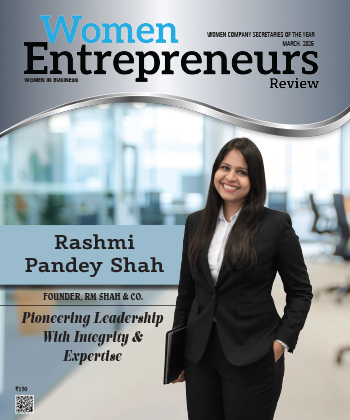
Women in Leadership: The Key to Success in A Changing World
By: Shivali Chakravarthi, Managing Director, Marsh Operations, Global Capability Center, Marsh McLennan - India
Shivali has 25+ years of experience largely in Banking, Financial Services and Insurance sector. Prior to joining Marsh McLennan, she worked with Jardine Lloyd Thompson, ICICI Bank, Orange, Capita and Prudential. Her experience includes management of customer service operations, encompassing client-facing interactions, voice services, and back-office functions, all while driving operational excellence.
In a recent conversation with Women Entrepreneurs Review Magazine, Shivali discusses various facets of women in leadership roles. Reflecting on the evolution of women leaders over the past decade, she emphasized the importance of considering diverse perspectives when making decisions as a leader. Drawing from her personal experiences, she highlights the necessity for leaders to navigate challenges and adapt to changing circumstances.
Shivali firmly believes that resilience is key to helping women overcome obstacles and setbacks. She also underscored the significance of mentorship in fostering women’s professional growth. She encourages women in the workforce to have confidence in themselves, regardless of the challenges they may face, as this self-belief will pave the way for their advancement.
Read the article to know more.
How will the role of women in leadership evolve over the next decade? What strategies do you believe are essential to support this evolution?
The role of women in leadership is evolving, with a growing emphasis on inclusivity, adaptability, equity and empowerment. The focus is shifting to merit-based growth opportunities, and organizations are beginning to understand that diverse leadership teams lead to better outcomes, innovation, and resilience. Listed below are some strategies that can help women assume leadership roles:
Support women in STEM fields: Encouraging women to pursue careers in science, technology, engineering, and mathematics (STEM) can lead to greater representation in leadership roles within these sectors.
L&D and mentorship: Establishing mentorship and sponsorship initiatives can provide women with the right guidance, support, and opportunities to advance into leadership positions.
Foster work-life balance: Designing policies that support work-life balance, such as flexible working hours and parental leave, can help retain women in the workforce and enable them to pursue leadership roles. Initiatives like ‘returning mothers ’program’ can also be a great catalyst.
Walk the talk: Emphasizing the right behaviors and monitoring metrics related to women in leadership is crucial for fostering an equitable workplace. By holding ourselves accountable to these standards, we can drive focus and address any inappropriate behaviors that may arise.
How do you approach decision-making as a business leader? What strategies do you use to ensure diverse perspectives are considered?
Most of the time, I involve my team in the decision-making process because it gives me multiple perspectives, helps me understand challenges directly and listen to what the team thinks, so that I have better visibility into the long-term impact of the decision. But to have an open and honest dialogue with the team is essential to create an environment where diverse viewpoints are welcomed and valued. As leaders, it is important to understand how to balance emotion with reason and take decisions that positively impact oneself, the team, and the organization.
Can you recall a moment when a major operational decision led to unexpected results?
Early in my career, I was offered a secondment position that required me to temporarily relocate from India to Kuala Lumpur. Despite my son being young at the time, I chose to embrace this opportunity.
This experience taught me how to effectively manage diverse teams across different cultures and develop cultural competence. It instilled confidence in my ability to take on new opportunities while maintaining a healthy balance between my work and personal life. It was a significant learning experience that has greatly contributed to my professional growth.
In a world where operational excellence often takes center stage, how do you prioritize the development and advancement of women in your team to ensure they are recognized for their contributions?
The key strategy is to provide early career support. At Marsh McLennan’s India GCC, our colleague resource groups, particularly the gender-focused groups, play a pivotal role in supporting women across various stages of their career. For early careers, these groups provide mentorship, peer networking, and tailored skill development programs to help women build confidence and navigate the early stages of their professional journey.
Supporting women during life milestones (e.g., Maternity Leave, Career Breaks) is also important. For women at the stage where they are balancing career and family, we have returning mothers programs, flexible work policies, and family-oriented benefits that ensure that women can balance their new priorities effectively without compromising on their career.
Another key factor is to foster leadership development at mid-career. As women approach mid-career, we also have a Women Leadership Forum that offers focused mentorship and targeted development programs to prepare women to step into leadership roles confidently.
How has your journey in global operations shaped your perspective on the importance of mentorship for women, and what steps have you taken to mentor emerging women leaders?
I have had the opportunity to mentor women at various stages of their careers, including through diverse programs and initiatives aimed at supporting women entrepreneurs. Through this experience, I have learned that women navigate different phases in their professional journeys differently, and mentoring programs can provide valuable guidance on how to advance in their career. The one thing I always tell women I am mentoring is to believe in themselves and their capabilities. I recall an instance where a woman colleague was feeling insecure about her career prospects because she was about to go on maternity leave. I talked her through this and encouraged her to live in that moment and embrace the joy of motherhood. Maternity/career breaks for specific reasons should not be seen as a hindrance to achieving your goals. Through these moments we learn, we grow and become better individuals. I highlighted the importance of living in that moment and believing in her ability to return and pursue her career goals.
What are the key qualities that will define successful women leaders in the future?
Successful leaders in the future, especially women in leadership roles, will need to embody qualities such as curiosity, courage, adaptability, empathy, kindness, emotional intelligence and inclusivity. The ways of working is changing every day. As the workforce evolves, leaders must be agile in navigating change and open to diverse perspectives. Additionally, fostering a culture of collaboration and empowerment will be essential, as the new generation values authenticity and purpose-driven leadership. Ultimately, the ability to inspire and connect with teams will define effective leadership in the years to come.
Message to Readers
- Believe in yourself. It can help break many barriers.
- Success and failures are part of the journey. So do not link failures to competency.
Most Viewed
- 1 Women's Health Startup HerMD Closing Doors Amid Industry Challenges
- 2 5 Famous Women in Indian Armed Forces
- 3 Saudi Women No longer Require Male Permission for Clothing Choices, says Prince MbS
- 4 Kolkata Medtech Startup Innovodigm Raises Rs 5.5 Crore Seed Funding Led by IAN Group
- 5 Yamunanagar's Kashish Kalra Honoured after Securing 111th Rank in UPSC Civil Services Exam
- 6 Madurai Appoints Its First Woman Corporation Head
- 7 IAS Vijayalakshmi Bidari Appointed as the new Nagpur Divisional Commissioner
- 8 American Entrepreneur Lucy Guo Overtakes T Swift to become Youngest Female Billionaire
- 9 ICC Women's World Cup 2025 Trophy Showcased at Indore's Holkar Stadium
- 10 Aparna Saxena's Beauty Venture AntiNorm Launches in India
- 11 Vidya Nataraj Co-Founded BlueStone Jewellery & Lifestyle files IPO
- 12 5 Women Freedom Fighters of India
- 13 Dr. G Krishnapriya appointed as CEO for Trichy
- 14 M3M & Sirona Partner to Introduce Menstrual Hygiene Vending Machines in 15 Locations
- 15 Punjab Govt launches SHE Cohort 3.0 Supporting Tech-led Women Startups
- 16 Indian origin Lawyer, Sweena Pannu appointed as the US New Superior Court Judge
- 17 The Aurora Tech Award recognizes 4 Indian Women-led Startups
- 18 Kerala's Republic Day parade featured an all-female tableau
- 19 Manisha Kabbur Becomes Karnataka's First Woman International Karate Coach
- 20 Director K. S. Ravikumar's Daughter Maalica Ravikumar Launches Life Coaching Company 'Evergrowth Academy' for Women
- 21 Leezu's Raises Pre-Seed Funding to Accelerate Growth in Sexual Wellness Industry
- 22 Sattu: Super-easy summer drink for PCOS gut healing
- 23 Swathi Nelabhatla creates Sitha App, India's First Women-Exclusive Gig Platform
- 24 7 Timeless Female Kathak Dancers & their Iconic Legacies
- 25 Meet 7 Iconic Women Architects of Modern India & their Most Impactful Work
- 26 This Woman-led Insuretech Startup is Helping Bridge the Education Financing Gap in India
- 27 Women Leaders Share Lessons Learnt from India Women's WC Win
- 28 5 Enterprising Women Founders Powering Singapore's Tech & Innovation Landscape
- 29 4 Women. 4 Stories. One Vision for Smarter, Stronger Healthcare
- 30 Global Gender Gap Narrows to 68.8%, But Full Equality 123 Years Away: WEF Report 2025
- 31 Changemakers: 7 Women Entrepreneurs Taking the Make in India Movement Forward
- 32 Meet Lucy Guo, The Youngest Self-Made Female Billionaire Disrupting Tech
- 33 How Women are Driving India's Festive Online Shopping Surge






